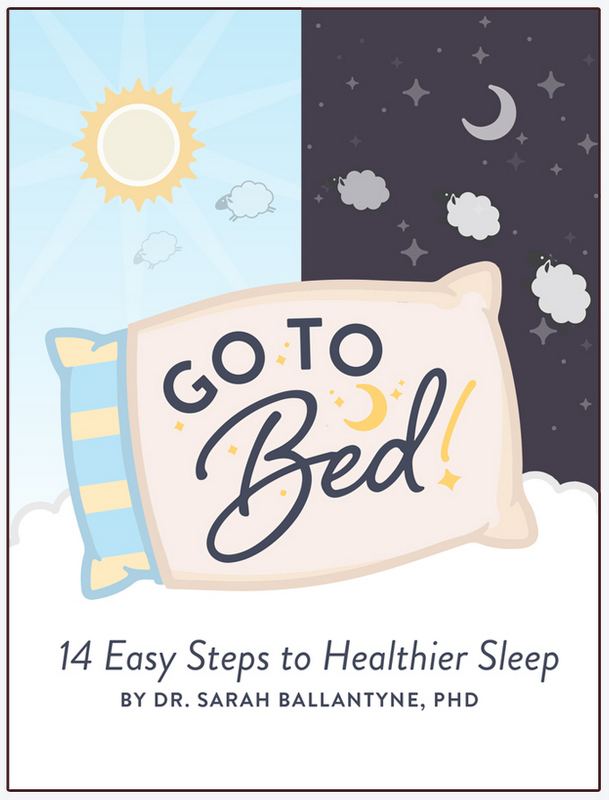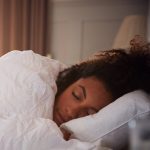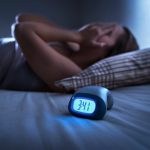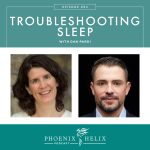“Sleep is that input to health that we so willingly give up for any other priority, yet it can be the one thing that holds everything else together.”
~ Sarah Ballantyne
How Important Is Sleep?
When it comes to reversing autoimmune disease, most of us focus on diet first and lifestyle second. Sometimes we’re just pacing ourselves, and we can only handle one change at a time. Sometimes our autoimmune symptoms interfere with our ability to sleep, and we need to start feeling better before we are capable of sleeping more. But at some point in our healing journey, sleep needs to become our focus. It is directly connected to inflammation, autoimmune expression, hormone balance, brain function, mental health, cardiovascular health, and weight management. Autoimmune disease often involves problems in all of these areas. If we want to heal, sleep is absolutely essential. This makes sense if you think about. Our body repairs and rebuilds while we sleep. If we don’t give it the time it needs to do this, how can we possibly reclaim our health?
My Personal Sleep Challenge Experience
When my rheumatoid arthritis was at its worst, sleep was almost impossible, because lying down put pressure on my inflamed joints and was incredibly painful. I spent many nights trying to sleep in a Lazy-boy chair. As diet changes successfully began reducing my inflammation, I was able to sleep in bed. At first I needed bolsters and had to turn over frequently, but I felt grateful to be able to sleep at all. As my inflammation reduced even more, I was able to sleep comfortably. But guess what? I found myself slipping back into my old “night owl” habits: staying up later and later, getting less and less sleep, and trying to catch up on the weekends. Here’s the thing – you actually can’t “catch up.” Science shows that even though you may feel more rested after a night or two of longer sleep, your inflammatory genes stay activated. The way to turn off inflammation permanently is to get 7-10 hours of sleep every night, without exception.
So, I gave myself a 30-day sleep challenge. I started with a bedtime and a waketime. That’s the first step. You need to get on a schedule – our bodies like consistency. I set a timer to wind down an hour before my bedtime. I went to bed whether I was tired or not. And I got up at my waketime, whether I wanted to or not. Truth talk: It was hard at first! I was cranky about it; I didn’t like making the change. It was hard to fall asleep at first, and I didn’t like getting up early on the weekends. But then after a couple of weeks, something magical started to happen. I fell asleep more easily, I woke up feeling rested, and by the end of the month, my mood and my energy levels were higher, and my inflammation was lower. Sleep is a powerful thing!
Sarah Ballantyne’s Experience with Sleep
Sarah Ballantyne (aka The Paleo Mom) is the author of this e-book, and she chose to write it because sleep is a huge factor in her own Hashimoto’s health. I interviewed her for my podcast: Beyond Food: Healing Lifestyle, where I asked people to talk about something that made a big difference in their healing that had nothing to do with food. Sarah said that 9 hours is her “sweet spot” for sleep, and if she gets less than that, her health plummets. Even knowing this, it’s a challenge for her to prioritize, because she has children, a business, lots of goals, and there’s limited time in the day. It’s so easy to prioritize other things over sleep, yet when we do, we pay a huge price, especially if we have autoimmune disease. When Sarah sacrifices sleep, not only is she more likely to have an autoimmune flare, it’s also harder for her to make healthy choices in general. When she’s tired, she craves unhealthy foods and finds stress much harder to manage. Can you relate? It’s all interconnected. So, what does she do? She makes a commitment to her own sleep. She follows the steps outlined in this e-book to entrain her circadian rhythms, which makes it easier to fall asleep at night, sleep deeply, and wake up feeling refreshed in the morning. In terms of time management, she gave up watching TV and strictly limits social media. While we often think our lives are too busy to sleep, most of us spend a surprising amount of time each day on these two things or something similar. Sleep is definitely more important than TV.
Do You Have a Sleep Debt? Answer These Questions:
- Do you have to set an alarm in the morning? Would you sleep past your alarm time if you didn’t have one set?
- Do you drag yourself out of bed? Or need caffeine in the morning to get going?
- Do you always sleep in on the weekends?
- Do you get less than the minimum 7 hours sleep per night even once or twice per week?
These are questions from the e-book, Go To Bed. If you answered yes to any of them, it’s time to reverse your sleep debt and start prioritizing sleep for your health.
What I Love About This E-book
- The Science Behind Sleep – If you’re a fan of Sarah’s work, you know she’s a scientist by training and excels at research. This e-book explains in detail all of the ways sleep (or lack thereof) impacts your body and your health. It’s all the information you need to motivate you for change.
- Detailed Advice for Improving Sleep – While the first step is to make a commitment to your sleep, it isn’t always easy to get quality sleep. This e-book teaches you all the factors that influence sleep vs. insomnia. There are many steps you can take to start sleeping like a pro.
- A Guided 14-Day Challenge – One of my philosophies is that “baby steps still get you there.” Establishing a healthy sleep pattern, including the lifestyle changes necessary to support it, is a lot of change. It can be overwhelming to try to do it all at once. This e-book gives you just one task a day, and each one builds on the day before. By the end of two weeks, you will hopefully be sleeping more soundly, and enjoying the changes you’ve made to your routine. There are two ways to do this challenge. You can start any time you want, and there’s even a link in the e-book to sign up for daily emails with tips and reminders to support you. You can also join the online group challenge that starts on the first Sunday of every month. The e-book includes links to Facebook groups you can join for peer support from others going through the challenge with you. This month’s challenge starts Sunday, April 3, 2016 and I’ll be sharing a daily sleep tip on my Facebook page each of those 14 days.
- Practical Tips, Advanced Tips, and Answering the Question, “Why?” – If you follow my blog, you know I’m all about the practical. While I can geek out on the research, in the end I want to know how to implement it in my life. The 14-Day Challenge is very practical. It offers troubleshooting tips if you’re struggling with implementing that day’s task. There’s an advanced challenge if the day’s task is already part of your routine. And there’s a “Why?” section that explains how that task improves sleep, which is perfect for a questioner like me.
- It Doesn’t Stop on Day 15 – This is about making a lifestyle change. The 14-Day Challenge gets you started. The rest of the e-book provides with the information and resources to keep going.
You May Also Be Interested In
Update: A giveaway was held to celebrate the publication of this ebook, and the winner was chosen with a random number generator. Congratulations to May! If you didn’t win, don’t despair. You can buy your own copy here.










And we have a winner! May, I sent you an email with the details. Congratulations! And for those of you who didn’t win, you can buy your own copy of the ebook here: http://bit.ly/1ocWnHm and those amber glasses are available through Amazon: http://amzn.to/1wIREzT . Sweet dreams, everyone.
I get about 6 hours of sleep each night. I want more sleep but for some reason I fight myself to not go to bed. I really do not understand myself.
FYI I am a stage 4 cancer survivor and I think I maybe wanting to do as much as I can while I am awake… to get the most out of life.
Eva, you do know yourself! That does make sense to me. The only problem is that the less you sleep the less likely you are to stay healthy. Reading this book might really help you, because Sarah shares all of the science in detail, so you understand exactly what’s happening to your body when you sleep vs. when you skip sleep. Wishing you a long and beautiful life!
My sleep varies depending on my flare. I’m still flaring so i definitely need more sleep. I average about 7 hours.
Unfortunately I’m not getting much “quality” sleep these days. I have nerve pain from a shoulder injury that wakes me up multiple times a night!
Shelly, I know how frustrating that can be! Does hugging a pillow help you? That always helped me when my RA pain was bad in my shoulders.
Hi Eileen! I sleep 7-8 hours each night but started to wake up at least once every night. I’m searching for tools for improving my sleep. I tried massage, magnesium but didn’t work for me and now I am starting to incorporate healing yoga. I feel that when I have an interesting and fun day I sleep without waking up! I’m eager to learn more through this give away and get my hands on the Go to Bed ebook and those sexy pair of amber glasses!! 🙂 Thank you for this give away and for inspiring me always!!
I struggle with getting to bed early enough largely because of living with teenagers who have a hard time shutting down at night. Previously it was also my husband but because of his lack of respect for my health needs (sleep being a huge one) I no longer live with him. The same lack of respect was reflected in our youngest two children, both teenage males, but they are coming around now in the absence of the ring leader. I strive to improve their sleep habits too, as they struggle with school demands, and although they can be stubborn (and are ultimately responsible for their own decisions) I am seeing an increased willingness to take their own health more seriously and make positive changes. I’d love to do a go to bed challenge with my guys!
Beth, I love the idea of a family Go To Bed Challenge!
It changes night to night, but usually around 6-8 hours. But it doesn’t matter, I can sleep for ten and still be tired all day. I try not to stay up late, but I homeschool and raise dairy goats and now that I have started the AIP diet I struggle trying to not spend all of my time in the kitchen.
The AIP is a learning curve, but it will get easier with time, Brianne. Batch cooking makes a big difference! Here’s a blog post about that, and here’s a video program if you want to learn more: AIP Batch Cook
I do get a lot of sleep, but only because I am able to sleep in very late in the mornings… However, I end up staying up late and my quality of sleep is terrible! I think this program would be very helpful for that!
I get on average, around 3-1/2 hours of sleep a night. I do try. I have several autoimmune conditions, and a complex sleep disorder including narcolepsy with cataplexy, sleep paralysis, and other parasomnias. I’ve made significant changes to my lifestyle in an attempt to have a healthier, longer life, and to reduce flares and complications. Nutrition and exercise have been easy to adjust, my sleep is still a mess. I’m working with a neurologist/sleep specialist. I have got to get more sleep.
Tracy, you sound like you are doing everything right! Wishing you continued improvement in every area of your life, and a slow and steady increase in your hours of comfortable sleep.
I get into bed 8hrs before I have to get up but with the amount of times I get up to use the restroom and it takes to fall asleep it equals out to about 6hrs. Some nights I do better and sleep all the way and I feel fabulous. Have been reading all the reviews on this new book amd challange and have been considering adding this into my health protocol along with the AIP I have already been doing that I love your site for helping me with and have been sharing with others!
3-8 hours. Sometimes my pain awakens me. I usually pop a Benadryl before bed.
I usually get somewhere between 7-8 hours of sleep each night. It always feels like I wake up and am still not rested. Been using the Microsoft Band to track my sleep patterns and it shows that I wake up at least 3 times each night even though I think I am still sleeping.
I try for at least 7 hours of sleep, but it varies more than I’d like. Those glasses are pretty cool.
On a average good night I get around 5hours. Usually I can’t sleep so get about 3-4 chopped up between getting up because of pain or bathroom trip. I have started small changes such as not being on IPad or phone at least an hour before going to bed and limit tv too. It’s hard especially when you ain’t sleep and reading doesn’t work due to brain fog and lack of focus so you default to electronics to pass time and hope sleep comes.
Those small steps will make a difference, purpletreasures! Baths are also a great choice when you’re having trouble sleeping.
6-7 hours per night. It’s probably my biggest weakness. I can eat a strict diet, get to the gym, etc. but I can’t make myself go to sleep. I’m a night owl by nature, but that doesn’t work when you have to get up at a reasonable hour in the morning to be a functional adult.
It was a tough change for me too, Clara, but so worth it!
I try to get at least 8 to 9, but I have 2 small children and it is hard. Sometimes I cannot sleep because I “know” they are going to wake me as soon as I go to sleep…which generally happens.
It started at the age of 27, I’m now 60. Always slept great until one night at the age of 27. I get 3 hours without sleep aids. With sleep aids about 5-6 hours. I have a hard time going to sleep now, but I use to be able to fall asleep just not stay asleep. I feel like I have no life as I’m always feeling fatigued… No one has been able to help me …
Thanks and God bless
Rena, that does sound exhausting! This ebook is very detailed and includes troubleshooting as well, so my hope is that it’s the help you’ve been looking for.
I get about 8 hours a night right now, but I’m my best around 9. If I get even just a little less for a couple days in the same week, I’m sunk. My biggest challenges sleep-wise are the bright lights outside my window, and the fact that my partner doesn’t get in until late and I often stay up waiting for him.
Have you considered blackout curtains, Mary?
I was doing ok until we went to France a year and a half ago and now I can’t get to bed before 1 am and so I’m only getting about 5-7 hours of sleep per night. It’s definitely been a factor in how bad my Hashimoto’s symptoms are.
Yes, it’s time to switch those circadian rhythms back to US time!
I currently get roughly 8-9 hours a night and I recently changed two parts of my routine that have made it possible for me to wake up about 15 minutes before my alarm without being tired most mornings, asleep before 11 and setting my alarm for when I need to get up instead of 30 minutes before which I had been doing… but the asleep between 10-11 has been very difficult to break due to my night owl habits, mine is using my phone and all its blue light.
Keri, I don’t know what kind of phone you have. While it’s best to turn the phone off completely in the evening, if that’s not an option for you, iPhone added a Night Shift option with their latest update which tones the blue light down to orange. And I believe f.lux can be downloaded on other types of phones.
I SO need this. Thank you!!
I find sleep to be so important! I have noticed a change in my symptoms and my attitude when I lack sleep. I make it very clear to my husband to never wake me up to cuddle! I am not pretty or pleasant to be around when I am in a sleep deprived state.
I need to start this so much. Here I am at nearly midnight googling about going to bed instead of doing it. I usually get about 6 hours and hardly ever begin midnight. I so so so want to fix this 🙂
Would love this as I recently ended up in ER followed by a stress test (all ok) due to chest pain. No one believe me it was from lack of sleep – about 3-4 hours per night. Pain and pattering make it hard to sleep, and a long term inability to go to sleep easily make it frustrating as well. Lying there exhausted whilst unable to sleep sucks. Thanks for such a great offer
Diane, you are so right that lack of sleep can cause that. The science is clear on its impact on our health. You would think doctors would know that.
I currently get somewhere between 5 and 7 hours a night. I shoot for 7.5 because I feel better with that, but it is hard to wind down at night with our busy family schedule.
Usually 8 hours. Just can’t function properly without it so it’s a priority. I notice though, if I make/let myself sleep in a little longer I look and feel healthier so goal is to get a little more. Have been focusing a lot on AIP diet, need to and want to give this more attention 🙂
Right now I average about 7-7.5 but I can tell I really need about an hour more of sleep. Most nights I sleep really well when I am asleep and that is mostly due to the fact that going AIP has been a lifesaver. I used to have a hard time sleeping due to muscle pain in my back due to my Hashis. Several months of AIP completed eliminated my pain and my thyroid is actually working better! I still have off weeks on my sleep due to adrenals or a small flare but it is becoming less of a norm thankfully.
LaTanya, thanks so much for sharing your AIP results! That’s wonderful.
I sleep seven to eight but always feel better if my body will do nine. But at least it is better quality sleep now than it used to be. However, I’m worried about my elderly father who only sells maybe 4 to 5 hours a night. Do older people need less sleep? I’m sure it is affecting his health and wellbeing. Dopes Sarah cover that in the book? It would be wonderful to know!
Hi Sharon. The elderly don’t need less sleep. In fact, most older people I know including my own parents and in-laws are sleeping more than they used to. Has your father considered napping? That’s a great solution if it’s difficult for him to sleep a long time at night.
I get approximately 10 hours of non-restorative sleep. The last sleep study I had showed that I was only getting about 8% of my REM! The Dr. put me on Trazadone & Tizanadine. It still takes me a couple of hours to fall asleep, and I feel like I sleep harder, but still never refreshed when I awake.
Meg, the troubleshooting section of the book might be especially helpful to you.
Great, pick me then!!! Lol
I aim for 8 hours minimum, but life keeps getting in the way! I guess it’s time to make sleep the priority that it always should have been:)
I get 7-10 hours of sleep but I’m up late and wake late…my day doesn’t feel productive until after noon. Help adjusting my rythms and understanding how is my intent. Thank you for the opportunity to do so.
I get anywhere between 6 to 8 hrs of sleep a night and I’m usually up a couple of times in between…I’m actually surprised if I wake in the morning having not gotten up at least once! I do try to get to bed an hour early to relax first.
I love my Fitbit for tracking my sleep. Too bad it can’t actually make me go to bed earlier! I find that I average right around 7 hours of sleep per night. I usually hit the 9 hour mark one day per week when I don’t have to work, which tells me I’m really not getting enough. Interestingly, I have found that I consistently have a faster rate of weight loss when I’m averaging around 8-9 hours of sleep per night. Not really 100% sure why that’s the case, but it’s true. When my weight loss starts to plateau, I make myself get more sleep and that, more than anything else, fixes the problem. Literally fixes it overnight! 🙂
That definitely matches the research, Diana. Way to be tuned into your body!
I go to bed at 10 pm almost every night and get 7-8 hours disturbed sleep. I use guided meditation 3-5 times thru each night to go back to sleep. If I catch the wakefulness right away I can usually go back to sleep in 10 minutes. I’m usually refreshed in the morning, but not always.
This is a great troubleshooting tip, Donna! Thanks for sharing. When my mother had insomnia, I recommended she visualize the ocean breathing in and out with the waves. It always helps me fall back asleep, and it helped her, too!
At the moment, I get anywhere from 4-9 hours, but only because I have the luxury of sleeping until at least 8 because of my son’s school schedule. I have the hardest time falling asleep…my brain is firing on all cylinders, I’ve got random song lyrics looping on repeat, and everything I didn’t do and all the things I need to do just scream at me for hours. Usually I can stay asleep once I fall asleep, but some nights I’m restless and wakeful all night. I know my body is suffering because of it, I can feel it.
Hi Jessica. I’ll be sharing tips on my Facebook page for the next two weeks, and one that really works for me is to keep a notebook by my bed to write down that to do list and help me let it go until morning.
I received a FitBit for Christmas which has given me so much interesting feedback on my sleep. The main revelation has been to see, each morning, the number of hours of sleep I actually received – most nights I get 5 to 6 hours. The first challenge for me will be to go to bed early enough to fit in more hours of sleep before I must wake up for work!
The amount of sleep varies… I usually fall asleep easily (and if not, my spike mat will do it for me) but wake up several times after 2 o’clock. So annoying!
This is such a common problem and it’s all about adrenal fatigue and imbalanced circadian rhythms. The book is all about correcting those rhythms for better health and better sleep.
I sleep so much better when I can exercise before 4:00 and feel tired physically…then I get 8 or so but during the week when I have to work on the computer after getting my daughter to bed I am lucky to get 6.
Diana, that shows the power of circadian rhythms. What we do during the day has a big impact on our sleep at night.
I don’t sleep more than 4-6 hours a night. A few weeks ago a friend offered me a meal and said it was non GMO and certified organic but it had corn in it and I had a bad reaction, vomiting all night and my adrenal glands got angry so I was up at 3am every.night for over a week.
I get 6-8 hours, but broken and never wake rested.
I get between 4-7 hours of sleep. But, my sleep reversed about eight years ago, and no one has been able to help me get it back to night time. So, I sleep during the day and am awake all night. It is so hard.
I get about 6 hours of broken sleep per night. Or less if I can’t get back to sleep once it’s been broken – very frustrating. Thanks for the give-away! Love your blog – it’s SO helpful!
I probably get between 4 and 8 hours of sleep per night. It’s hard to tell as I am constantly waking up and then often have difficulty going back to sleep. I would love to solve the mystery of why I do not sleep well.
I have been doing a healing protocol this year, and I’ve noticed if I get less than 8 hours of sleep, it is impossible for me to function. I normally get 6-8 hours of sleep and always wish for more.
I get about 4-5 hours of sleep a night and wake up periodically through out the night. I set an alarm but more times than not I wake up before alarm (regular wake time due to schedule). I feel so tired in the morning & late afternoon I feel so tired, like I am in a fog. After awhike i feel like my eyes burn and my muscles feel sore. I tried going to bed sooner but then I would just wake up sooner. I often use guided meditations which help me fall asleep faster (I used to only get about 3-3.5 hrs of sleep) but can’t get past the 4-5 hrs and still no solid sleep. One doctor had me try medication & another doctor gave a natural supplement but they only caused my dreams to be more vivid and disruptive than they already were. As I have gotten older the lack of sleep esp without disruptions has taken a toll.
Veronica, no wonder you’re tired. Yes, I’m sure it’s cumulative, and you’ve obviously taken some steps to help, which is wonderful. The book has a lot more suggestions for you to try, including a troubleshooting section.
I get about 7 hours per night most nights.
I’ve had a problem with sleep since I was a child. I get about 6-7 hours during the week, and more on weekends. I always wake at least twice during the night, and my sleep is seldom very deep. Chinese herbs, prescribed by a qualified practitioner, have been a great help–it used to be much worse than it is now. I’m looking forward to learning more.
There is so much I have been willing to change (and some things, not so much). My new clean eating/whole30/almost aip except for some reason popcorn, I have been sleeping better.But my 4 rescue cats love their Mama and wake me at night to tell me they love me.
That’s a hard change to make, isn’t it Barb? I know Mary who commented below about her dogs can relate. But your cats will still love you in the daytime, and your health will likely take a jump forward without getting woken up at night. Still….one step at a time. You don’t have to do everything at once!
Hi Eileen, I used to sleep reasonably well although still needing to get up to pee at least a couple of times a night (I’m 69, does that make it okay?). Anyway, recently
I am having difficulty getting back to sleep after waking. This is mostly because I am incredibly excited about starting a blog so I wake up and start working on my computer, educating myself in so many areas.
Right now my sleep varies between 4 and 7 hours a night with at least a couple of pee breaks. I am used to getting 8-9 hours a night.
I’ve noticed that my celiac induced peripheral neuropathy has come back with a vengeance because I am not getting enough sleep!
Margaret, your body is certainly giving you feedback on that new habit! I totally get the excitement, but wait until daytime to do that research. Getting up and using the computer is the worst thing you can do for you sleep. The best thing you can do is stay in bed.
I’m getting from 5-7 hours of sleep per night! Thank you for doing this giveaway!
I sleep about 7 hours a night. Many times I wake up at 3am, hard to fall back to sleep. I listen to my own sound healing tape CD I can’t get back to sleep – it is with crystal singing bowls. It helps a lot.
That CD is a great troubleshooting tip, Shantara. Thank you for sharing! Waking up at 3am is a sign of adrenal fatigue, so taking the steps outlined in the book to correct your circadian rhythms might alleviate that.
Thank you, Eileen, for your excellent blog and books.
I look forward to your Facebook series about sleep.
Between 4 and 7 which is interrupted and unsettled 8 times out of 10 for the past 4-5 years. Trying to set wake up and sleep times to get into a routine no matter how my body feels. Any assistance would be great!!
I aim to get 8 hours of sleep a night. 7 is stretching it and anything over 9 seems to make me groggy, especially if I’m sleeping in late.
It sounds like you know your sweet spot, Malori.
Sleep is so important! I know that I need to make it a priority! I usually have between 6-7 hours of sleep each night. Any ideas from Sarah’s ebook would be so helpful! Thanks for the great give away!
I’m going to say somewhere between 3 and 5, and that’s getting up a couple times. It’s gotten better since I’ve banished the dogs from the bedroom, I found their moving around often woke me up.
Oh Mary, it sounds like you definitely need this book! That’s a very small amount of sleep.
Probably 7hrs. Sometimes 8. I feel great with 8 hrs.
I get 5-7 hours but it’s interrupted and I wake up constantly throughout the night. I could really use some help in this area!
I don’t think my sleep is too bad but have to get up in the night for the toilet. Does this protocol deal with that issue?
Linda – that’s often a sign of adrenal fatigue, and entraining circadian rhythms (as described in this ebook) is essential to healing that.
I usually sleep about 7-8 hours but sometimes less. It’s not enough and my problem is that my work starts at 6am so I have to get up really early and I have trouble going to bed early 🙁
Becky, this program helps you shift your night-time routine one step at a time, to make it easier to go to bed earlier.
I get about 8 hrs but they are interrupted by my sweet 3 year old who likes to cuddle or has to go to the bathroom. I would like to fall asleep earlier and get my son and I on a set schedule.
I have been trying to make sleep a priority and take of myself. With 5 kiddos it’s sometimes hard to do. I try to at least get 7 hours, but it’s usually broken up.
7 hours or more, but often broken.
I have been making sleep more of a priority lately and only stay up on the weekends with my husband, otherwise I’m in bed by 10 during the week. I get about 7-8 hours of sleep I would guess. I have a 3.5 yr old that wakes up every night, so I’m actually interested in improving his sleep as well (baby steps). Thanks for the chance to win! 🙂
Sami, if you haven’t already listened, I interviewed Paul Jaminet on my podcast and he talked about how he helped entrain his baby’s circadian rhythms for good sleep. Lots of great tips!
On my commute days (2-3/week), I get 6-8 hours. But a minimum of 9 hours works best for me. So when I’m not commuting I get closer to 8-10 hours. Would like to find a way to be more consistent each night.
Thank you I will listen to that next!
6-7 hours, fragmented. I’ve never slept well. I fall asleep faster since starting a meditation practise, but still wake up during the night.
That’s awesome that you’ve started a meditaiton practice, Tammy and you’ve noticed benefit already! Each thing we do to improve our sleep really does make a difference.
Between 5-7 hours nightly of restless sleep. Less when I’m in a flare. Thanks for hosting this giveaway.
May, you won the giveaway! I just sent you an email with the details. If you don’t see it, check your spam filter. Congratulations!
In total, probably 4 to 7 hours of sleep per night. Fragmented, and I usually wake up due to pain and then find it difficult to get back to sleep.